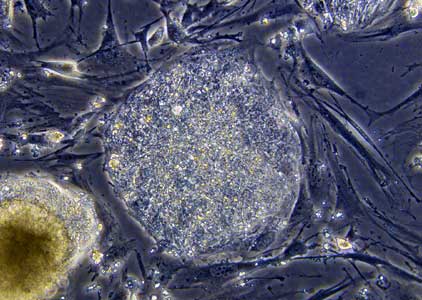Adult stem cells in testes may replace embryonic stem cells for organ regeneration

London, September 20 : Adult stem cells found in a male patient’s testicles may be used to create a wide range of tissue types that may help him fight disease, suggests a new research.
The breakthrough study in mice led by researchers from Weill Cornell Medical College in New York City indicates that stem cells in adult testes may help provide an alternative to the controversial embryonic stem cells.
During the course of study, the use of spermatogonial progenitor stem cells (SPCs) obtained from the mouse’s testes enabled the research team to redirect the cells' development in the lab to form the so-called "multi-potent adult spermatogonial-derived stem cells" (MASCs).
The researchers said that the MASCs further went on to develop into working blood vessel (endothelial) cells and tissue, cardiac cells, brain cells, and a host of other cell types.
In several previous studies, genetic manipulations were used to reprogram adult cells derived from connective tissue to acquire stem-cell potential, differentiating into various organ-specific tissues.
However, the reprogramming method used in the current study, known as "induced pluripotency", led to the generation of multi-potent stem cells that carried an increased risk of transforming into malignant cells, say the researchers.
"What's really novel about our work is that -- unlike induced pluripotency -- these mouse SPCs do not require any addition or tweaking of genes to get them to form the multi-potent cells (MASCs) that then go on to produce all of these cell types," senior author Dr. Shahin Rafii, Arthur Belfer Professor of Genetic Medicine and director of the Ansary Stem Cell Center for Regenerative Medicine at Weill Cornell Medical College, was quoted as saying by Nature magazine.
"Some hurdles remain, of course -- we have to replicate these findings in humans, and we haven't discovered the exact 'switch' that would allow us to control SPC development on demand. Nevertheless, it appears that these unique specialized spermatogonial cells could be an easily obtained and manipulated source of stem cells with exactly the same capability to form new tissues that we see in embryonic stem cells," Dr. Rafii added.
According to the background information in the magazine’s report, SPCs lie within a specific area of the testes, and their sole function is to generate the precursors to sperm.
"Normally, the spermatogonial progenitor cell is committed to only that function, and they're remarkably efficient, keeping men fertile well into advanced age," said the study's lead author, Dr. Marco Seandel, researcher at the Howard Hughes Medical Institute and researcher/medical oncology fellow at Memorial Sloan-Kettering Cancer Center in New York city.
Dr. Rafii credited Dr. Seandel with developing the first efficient means to growing large quantities of SPCs for experimental use in the lab, saying: "That really allowed us to go full steam ahead in examining the potential of these very interesting cells."
The researchers, however, concede that they have yet to understand the exact biochemical and genetic ‘switch’ that enables the cell to become MASCs.
"We still don't understand the exact biochemical and genetic 'switch' that tells the cells to become MASCs. Discovering that switch will be crucial to our being able to create MASCs on a routine basis," Dr. Seandel said. (With inputs from ANI)